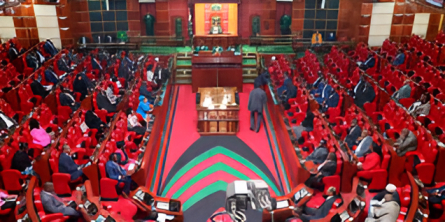Investors who brought in capital equipment worth at least Sh2 billion to boost manufacturing could soon benefit from backdated tax exemptions, if a fresh Bill tabled in Parliament sails through.
The Value Added Tax (Amendment) Bill, 2025, is seeking to exempt such equipment from taxation, backdated to January 1, 2024. The move is meant to encourage investment and eliminate confusion caused by wording in the current law.
According to the memorandum of the Bill, the amendment will clarify the exemption period by correcting the phrasing that previously read "after this date," which had caused uncertainty over when the tax relief begins and ends.
"The principal object of this Bill is to amend the Value Added Tax Act. The Bill amends the First Schedule in Paragraph 146 of Part I to remove ambiguity caused by the use of the words after thus date, to emphasise that the provision was to apply twelve months from the date of commencement of the Tax Laws (Amendment) Act," the document reads.
Section 146 currently provides tax relief for imported capital goods, subject to approval by the Cabinet Secretary, and with a condition that the investment value must be Sh2 billion or more.
It also outlines that this exemption continues for 12 months beyond January 1, 2024.
The proposed changes are expected to provide clarity for existing and new investors by creating a more predictable environment.
Speaker of the National Assembly, Moses Wetang’ula, has given the green light for speedy consideration of the Bill.
On April 1, he directed the House Business Committee to prioritise the Bill under Standing Order 42(2).
"The Bill has matured for its First Reading," Wetang’ula noted in a communication to the House, adding that the Committee on Finance and National Planning should table its findings without delay.
Besides clarifying timelines, the amendment aims to support the country’s broader manufacturing goals by reducing the cost of establishing large-scale production facilities.
In addition to the VAT Bill, lawmakers are also moving quickly on changes to the Excise Duty Act through a separate Bill.
The Excise Duty (Amendment) Bill, 2025—which has already received presidential assent—removes the excise tax on imported electric transformers and their parts.
This step is meant to lower costs for energy sector players and boost domestic transformer production.
"The principal object of this Bill is to amend the Excise Duty Act to remove excise duty on imported fully assembled electric transformers," the statement explains.
Previously, the 25 percent excise duty introduced in 2024 had led to a rise in the cost of transformer components, hampering both importation and local assembly.
The new law, sponsored by National Assembly Majority Leader Kimani Ichung'wah, reverses this, aiming to reduce the price pressure that had built up in the power sector.
The amendment is a response to concerns raised over the earlier duty’s effect on electricity distribution and manufacturing costs.
It reflects the government’s efforts to improve Kenya’s investment climate.
Both proposed and enacted tax changes signal a shift in policy direction aimed at reducing the cost burden on large-scale industrial and power sector investments.
As the Bills progress through the necessary stages in Parliament, investors will be keenly watching for implementation timelines and enforcement clarity.
